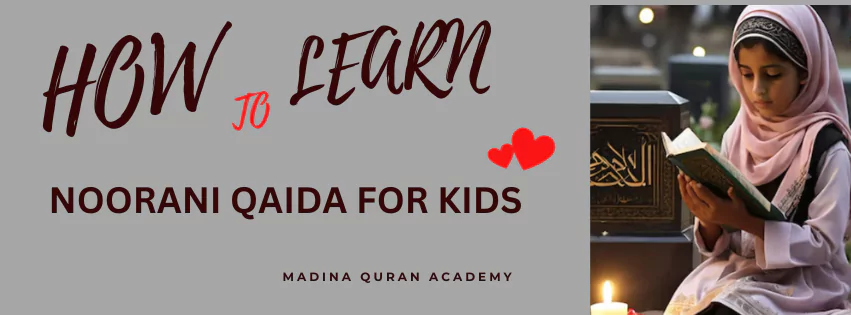
How To Learn Noorani Qaida For Kids?
Before reading Quran you should know first how to learn NOORANI QAIDA for kids as well as adults its the basic for learning Quran with tajweed.
Noorani Qaida isn’t just any booklet; it’s your key to unlocking the beautiful art of Tajweed.
In learning the correct way to recite the Holy Quran ,LEARNING NOORANI QAIDA is very important .
it serves as a foundational tool for perfecting in Tajweed
we’ve taken this traditional gem and given it a modern twist with our online version:
Our NOORANI QAIDA is Perfect for both kids and adults,
It transforms learning into an engaging and interactive journey filled with fun!
REASON OF LEARNING NOORANI QAIDA FOR KIDS ONLINE
Online learning offers unmatched convenience.
allowing you to progress at your own pace and enjoy the comfort of learning from home.
ALLAH desires that everyone should also read, seek knowledge, and learn.”
اقْرَأْ بِاسْمِ رَبِّكَ الَّذِي خَلَقَ خَلَقَ الْإِنسَانَ مِنْ عَلَقٍ اقْرَأْ وَرَبُّكَ الْأَكْرَمُ الَّذِي عَلَّمَ بِالْقَلَمِ عَلَّمَ الْإِنسَانَ مَا لَمْ يَعْلَمْ
“Recite the name of your Lord who created – Created man from a clinging substance. Recite and your Lord is the most Generous – Who taught by the pen –
Surah Al-Alaq (96:1-5)
Join us today and START your journey on this rewarding learning experience.
Understanding Noorani Qaida is crucial as it lays the foundation for proper Quranic recitation.
It ensures accuracy and reverence ,our team of expert Quran Instructors is dedicated to steering you through this enriching journey.
What you will learn from NOORANI QAIDA:
by learning Noorani Qaida you learn the following rules
Huroof E Tahajji(Alphabets and Pronunciation):
In Noorani Qaida course you will learn the right pronunciation of arabic alphabet
joining Words and Verse Formation:
Learn how to combine letters to create words and verses from the Holy Quran.
Reading Fluency:
Develop the ability to read the Quran fluently and independently by the course’s conclusion.
Tajweed Principles:
Understand the fundamental rules of Tajweed to enhance your recitation.
Start Your Journey of Leaning Noorani Qaida with Madina Quran academy!
Thousands of students already enrolled with Madina Quran, a reliable online platform for mastering Noorani Qaida
Our dedicated native instructors are accessible round-the-clock to guide you at every step.
Whether you’re a child or an adult, our engaging and visually appealing lessons ensure learning Tajweed is both enjoyable and effortless.
Don’t wait any longer—book your free trial class today and kickstart your adventure of reading the Holy Quran with Tajweed!
Learn Noorani Qaida for Kids Online:
An Easy Beginner’s Guide for leaning Quran
In this course you will learn about arabic latters .
1.Arabic Alphabets and their Pronuciation:
Arabic letters, also known as “huroof” (حروف) in Arabic
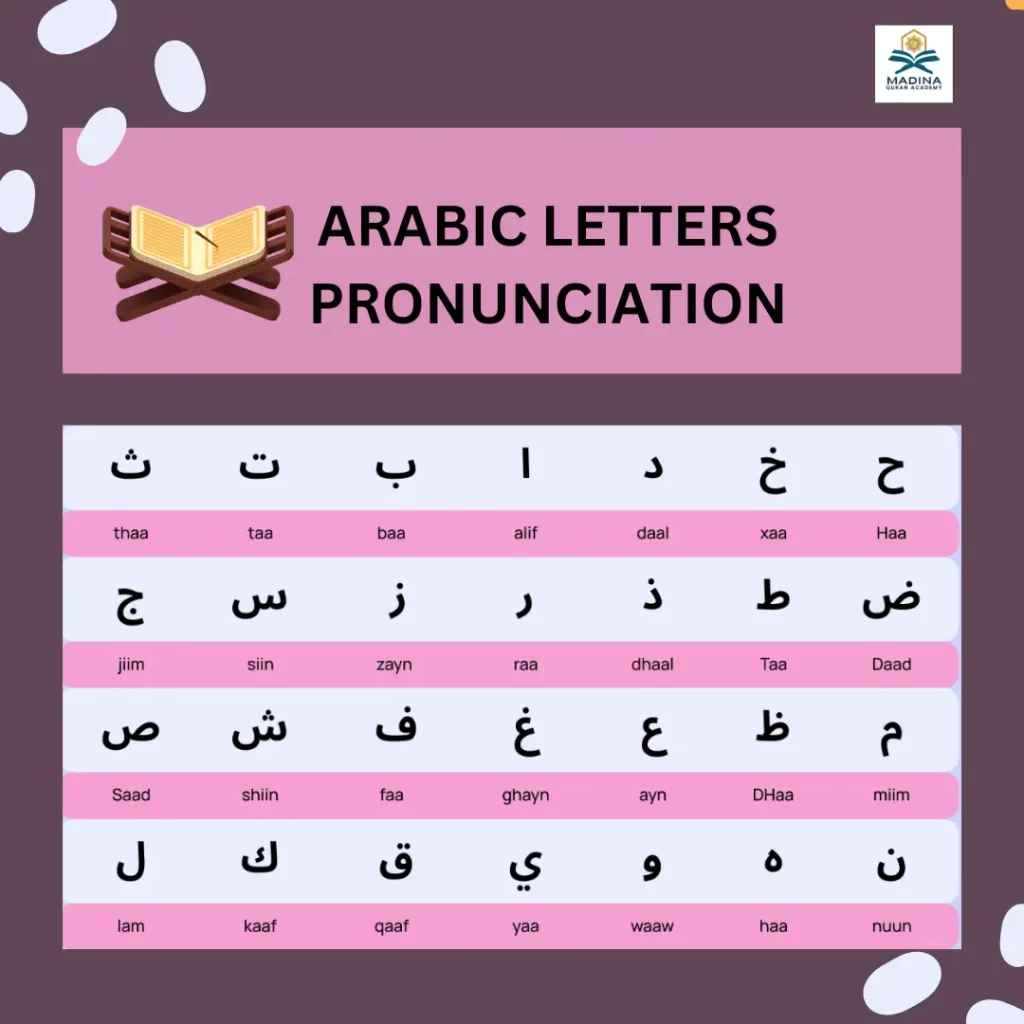
There are 28 letters in the Arabic alphabet, each with its own distinct shape and sound.
These letters are used to write the Arabic language and are the building blocks for forming words and sentences.
Some examples of Arabic letters include
“ا” (alif), “ب” (baa), “ت” (taa), and “س” (seen).
2. learn consonants:
Next, you will learn about consonants, the fundamental elements of word formation.
Comprehending consonants is essential for constructing meaningful words and sentences.
In the Noorani Qaida, consonants play a crucial role in mastering Arabic pronunciation,
3.Learn Noorani Qaida Vowels:
There are two types of vowels in Quran one is short vowels and second is long vowels.
3.1 Learn Short Vowels of Noorani Qaida:
Short vowels in Arabic, while not distinct letters, are denoted by marks,symbols positioned above or below the consonants they accompany.
These symbols are essential for accurately pronouncing words.
Understanding and mastering these symbols is essential for achieving proper Quranic pronunciation and fluency.
following are the list of 3 short vowels
3.1.1 Fatha,zabar (ـَ):
Pronunciation is similar to the ‘a’ sound in ‘cat.’
It is placed above the consonant.

Example: بَت /bat/ –
3.1.2 Kasra,zair (ـِ):
Pronunciation is similar to the ‘i’ sound in ‘sit.’
It is placed below the consonant.
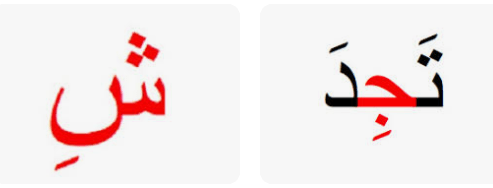
Example: بِت /bit/ –
3.1.3 Damma, pesh (ـُ):
Pronunciation is similar to the ‘u’ sound in ‘put.’
Usage: placed above the consonant.

Example: بُت /but/ – button.
Short vowels are often omitted in everyday writing but you may find a lot of these Arabic symbols in the Quran,
Arabic texts books of hadith and literature for learners to guide correct pronunciation.
3.2 Learn Long Vowels (Madd Letters ا و ي ) of Noorani Qaida:
pronunciation OF LONG VOWELS are for a longer duration of time than short vowels.
These long vowels, according to Arabic script, are denoted by distinct letters. They include Alif, Waw, and Ya, collectively known as “madd.”
3.2.1 Alif (ا):
Pronunciation: a lengthened ‘a’ sound, similar to ‘a’ in ‘father.’
Usage: usually comes after a letter with a Fatha.

Example: مَدرَسة /madrasa/ – school.
3.2.2 Waw (و):
Pronunciation: A LONG ‘u’ sound, same as ‘oo’ in ‘shoot.’
Usage:a :”Damma” comes after certain letters that sound strong.

Example: قُرءان /Qur’ān/ – Quran.
3.2.3 Ya (ي):
: A stretched-out ‘i’ sound, like when you say ‘ee’ in ‘see.’
Usage: Sometimes, a Kasra appears after a consonant.

Learn Noorani Qaida Tanween (ـًـٍـُـ)
Taween refers to the doubling of short vowel signs into Two Fathas,, Two Dammas, and Two Kasras.
Tanween resembles a nun with a jazm at the end of a word
Although it is written differently. Tanween is created by adding an “n” sound to the short vowels.
In two fathas, non-emphatic letters are pronounced as (EN)
In TWO FATHAS ,the sound as (AN), for example, “بً bann.”
In TWO KASRAS, the sound is (İN) as in “تٍ tin.”
In TWO DAMMAS, the sound is (UN), like in “سٌ sunn.”

Learn Noorani Qaida Rules Online at Madina Quran Academy
In Noorani Qaida course we will learn rules about following rules:
Learn Soft Vowels (Huroof Leenah) in Noorani Qaida
Learn Noon Sakinah & Tanween rules and understand its pronunciation
LEARN Rules of Raa and practice with our expert tutors
Learn Rules of Laam and experience the joy of reading Quran with correct Tajweed
Learn Noon Qutni rule and incorporate in daily Quran Recitation.
Learn Waqf (Proper Pausing and Stopping) rules that make you recitation more beautiful
In our Noorani Qaida course, you’ll start by learning how to pronounce the Arabic alphabet.
Then move on to word formations and Quranic pronunciation.
Our experienced teachers will guide you through the course, providing personalized feedback and support.
Ready to get started? Sign up for a free trial class today and begin your journey to reading the Quran with confidence!
DOWNLOAD NOORANI QAIDA FROM HERE
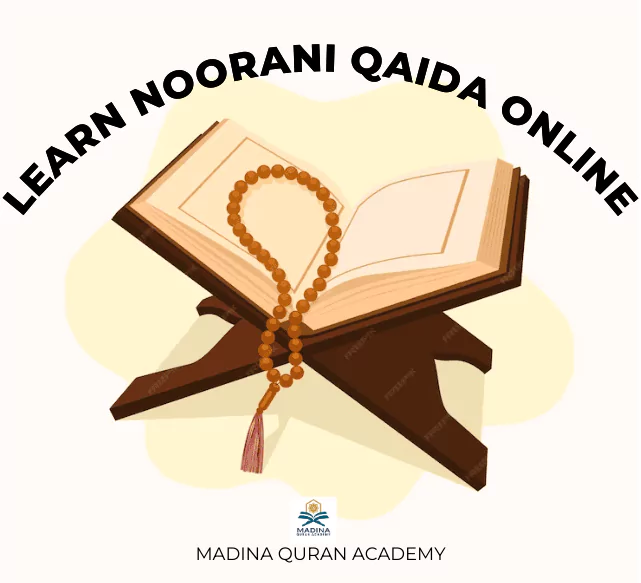
Learn Noorani Qaida online for kids /Qaidah Nooraniya Free Qaida Book
EXPLORE the Noorani Qaida online for kids through MADINA QURAN ACADEMY ,Our esteemed online Quran institute.
Our proficient Quran tutors hail from Pakistan and Egypt USA , offering tailored Noorani Qaida courses for both children and adults alike
Begin your learning journey with a complimentary Qaida Nooraniya Free Qaida Book
Start your Quranic education today! Enroll your child in Madina Quran Academy to master Noorani Qaida.
Our interactive online courses ensure effective learning for confident Quranic recitation and spiritual growth. Start the journey today with a free trial!
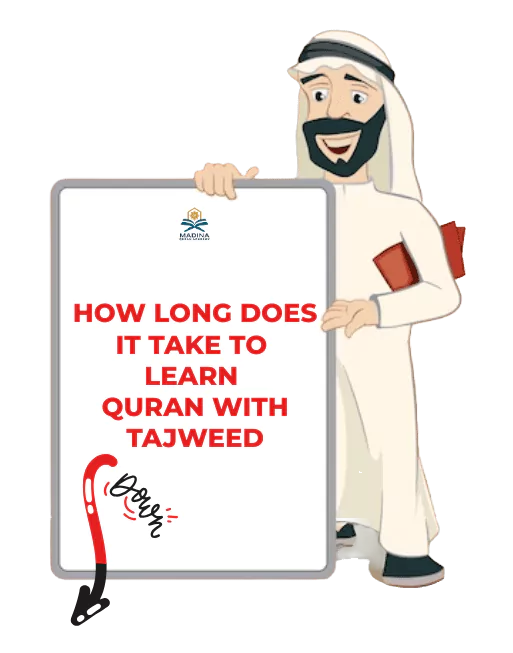
how much time taken to learn Quran with Tajweed ?
The time takes to learn Quran with Tajweed depending on several factors, including:
Your prior knowledge:
No prior experience: If you’re starting from scratch, it could take 6 months to 1 .5year to learn basic Tajweed rules and recite fluently.
Some Quranic background: If you already know the Arabic alphabet and have some recitation experience, it might take 4-6 months to master Tajweed.
Learning intensity and consistency:
Daily practice: if you are dedicating at least 30 minutes daily, and you could see significant progress within a few months.
Occasional practice: if you are learning once or twice a week will extend the timeline, potentially taking a year or more.
Teacher guidance and feedback:
Structured learning with a qualified teacher: Personalized feedback and corrections accelerate learning,
potentially leading to Tajweed proficiency within 6-12 months.
Self-guided learning: While it is also possible, but it might be slower and more challenging to identify and correct mistakes on your own.
Individual learning style and pace:
Some grasp concepts quickly: They might master Tajweed rules in 3-6 months with consistent practice.
never compare yourself to others. Don’t bother how much time others are taking
Focus on your own progress and celebrate small victories.
Learning goals and desired level of mastery:
Basic recitation with Tajweed awareness: This could be achievable in 6-9 months with focused practice.
Gaining a deep understanding of Quran recitation may require many years of focused dedication.
your memorizing ability and age:
The learning and memorizing ability very much depend on age .
children between 5-9 years memorize very efficiently
while elders take more time to memorize.
Here’s a rough breakdown of course completion time
- Basic Tajweed rules and recitation: 6 months to 1 year
- Intermediate Tajweed proficiency: 1-2 years
- Advanced Tajweed mastery: 3+ years
Remember, these are just estimates.
The most important thing is to approach learning with patience, dedication, and a love for the Quran.
make your journey happy , celebrate achievemnts, and don’t be discouraged and never give up by setbacks.
With regular effort, you’ll soon perfect your Tajweed and enjoy the beauty of recitation.
Conclusion
learning Noorani Qaida equips kids with fundamental skills for Quranic recitation.
With patience, repetition, and interactive methods, children grasp Arabic letters, pronunciation, and basic rules.
This foundation lays the groundwork for confident Quranic reading, fostering a lifelong connection with the Quran and deepening their understanding of Islam.
Join Madina Quran Academy to guide your kids in mastering Noorani Qaida.
Our expert tutors use interactive methods and personalized attention to ensure effective learning.
Give your children a strong foundation in Quranic recitation and Arabic pronunciation.
Enroll them today for a rewarding journey towards Quranic fluency and spiritual growth.


